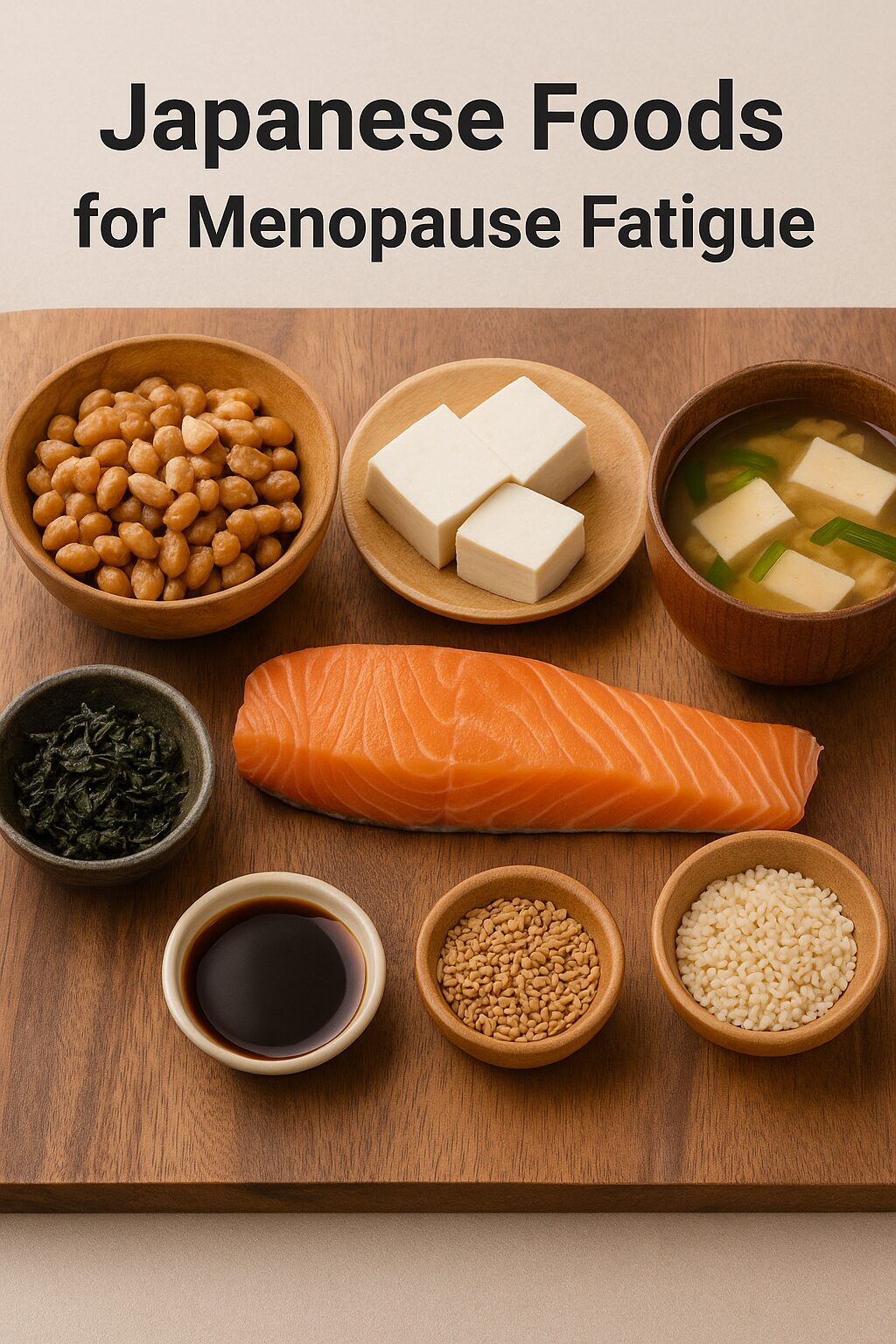As more women seek natural ways to manage menopause fatigue, many are discovering the gentle power of Japanese foods. From fermented soy to mineral-rich seaweed, traditional Japanese dietary habits offer a science-backed path to hormone balance and renewed vitality—without relying on synthetic hormones.
In this article, we’ll explore how these time-tested foods can help ease menopause-related tiredness and how they inspire natural supplements like Juveriente Effisoy.
 The only supplement to contain fermented soy isoflavone beside Japan.
The only supplement to contain fermented soy isoflavone beside Japan.
Understanding Menopause Fatigue
Why Does Menopause Cause Fatigue?
During menopause, levels of estrogen and progesterone decline. These hormones play a critical role in sleep regulation, stress response, and energy production. As they diminish, many women experience:
-
Chronic tiredness
-
Poor sleep quality
-
Brain fog
-
Decreased motivation
This fatigue can affect day-to-day functioning, even for otherwise healthy women.
The Limits of Conventional Treatments
Hormone Replacement Therapy (HRT) may help some, but it’s not suitable—or desirable—for everyone. Many women prefer to support their body naturally, which brings us to diet as a key factor.
How Japanese Foods Help with Menopause Fatigue
A Cultural Clue: Why Japanese Women Report Milder Symptoms
Researchers have long noted that Japanese women often report fewer or milder menopausal symptoms compared to women in Western countries. Diet is believed to play a major role, particularly the frequent consumption of soy-based foods and fermented products.
Let’s look at some key components of the Japanese diet that help combat fatigue during menopause.
Fermented Soy: Natural Phytoestrogens
Miso, natto, and soy sauce are staples in Japanese cuisine. These fermented soy foods are rich in isoflavones, plant compounds that mimic estrogen’s effects—especially in their aglycone form, which the body absorbs more efficiently.
Aglycone isoflavones are known to:
-
Support hormonal balance
-
Improve energy metabolism
-
Aid in sleep regulation
A study published in Menopause journal found that isoflavones may significantly reduce menopausal symptoms, including fatigue and insomnia.
Source
Seaweed and Mineral-Rich Foods
Japanese meals often include seaweed like wakame and nori, which are high in:
-
Magnesium
-
Iodine
-
Iron
These minerals are essential for thyroid function and energy production—both of which often decline during menopause. Iodine, in particular, supports the thyroid gland, which regulates metabolism and energy levels.
Dashi and Umami-Rich Broths
Traditional Japanese soups are made from dashi, a savory broth made with kombu (seaweed) and bonito flakes. Dashi is light, hydrating, and rich in glutamic acid—a natural compound that may help balance neurotransmitters and support brain function during hormonal shifts.
Balanced Portions and Low Sugar Intake
The Japanese diet favors small portions, limited processed foods, and low added sugar. Blood sugar stability is key to avoiding the energy crashes and mood swings that often worsen menopause fatigue.
A Modern Solution from Japanese Wisdom: Juveriente Effisoy
While adopting a Japanese-style diet is beneficial, maintaining these habits daily can be difficult—especially outside of Japan. That’s where supplements inspired by these traditions can help.
Juveriente Effisoy is a unique menopause support supplement that uses fermented soy extract rich in aglycone isoflavones. Unlike generic soy supplements, Effisoy is formulated to mirror the types of compounds Japanese women consume regularly.
What Sets Effisoy Apart?
-
Aglycone Isoflavones: The body absorbs these faster and more efficiently than conventional isoflavones.
-
Fermented Ingredients: Mimics how Japanese foods are traditionally prepared.
-
Non-GMO and Natural: No synthetic hormones or artificial additives.
Effisoy helps support:
-
Restful sleep
-
Sustained energy
-
Hormonal balance
-
Reduced fatigue
You can learn more about it on the official Juveriente site or its Amazon page.
Getting Started: Easy Ways to Add Japanese Foods to Your Diet
Simple Meals to Try
-
Miso soup with tofu and wakame
-
Brown rice bowl with natto and scallions
-
Grilled salmon with a side of seaweed salad
These meals are simple, nourishing, and deeply rooted in tradition. You can also find many of these ingredients at Asian grocery stores or online retailers.
Combine Diet with Natural Supplements
While food is foundational, supplements can fill the gaps. Combining a Japanese-inspired diet with a supplement like Effisoy may offer a gentle, yet powerful, approach to managing menopause fatigue naturally.
Final Thoughts
The fatigue that comes with menopause doesn’t have to be an unavoidable burden. By looking eastward to the Japanese diet and traditions, you can find time-tested, natural strategies to feel like yourself again.
Whether it’s a daily bowl of miso soup or a targeted supplement like Juveriente Effisoy, small changes rooted in tradition can yield big improvements in your energy, mood, and overall wellness.
External Resources
Take Effisoy®, a natural supplement, to balance your hormone back.
If you are facing an age-related hormonal imbalance, rebalancing it will work with a balanced diet for your beauty, weight management, and daily wellness.
Juveriente®’s Effisoy, launched in 2016, based on fermented soy bean germ extract has been loved as a natural menopause relief since its launching in 2016.
Its primary function is to boost the weakened synthesis of a hormone precursor, DHEA. It helps the precursor, DHEA. Rebalancing the precursor will eventually recover your hormones in line with your natural balance. It will help recover the hormonal imbalance and help you address various issues in postmenopausal period.
Here are some of the real product reviews in our Amazon shop.
“Restful sleep finally!!”, “I Am Now Free of Hot Flashes!!”, “Lifesaver”





